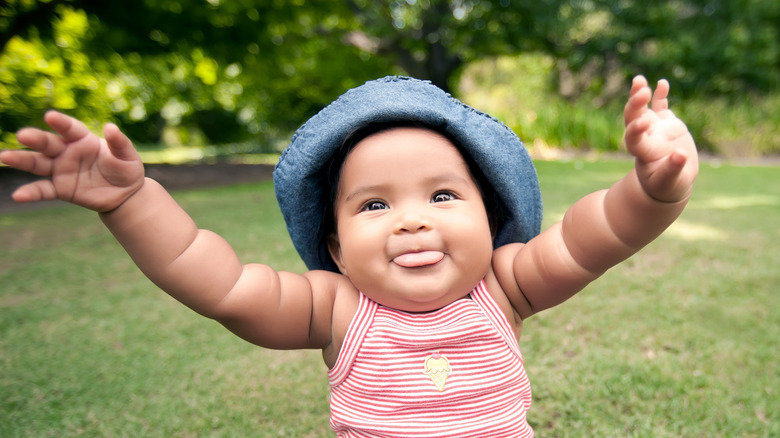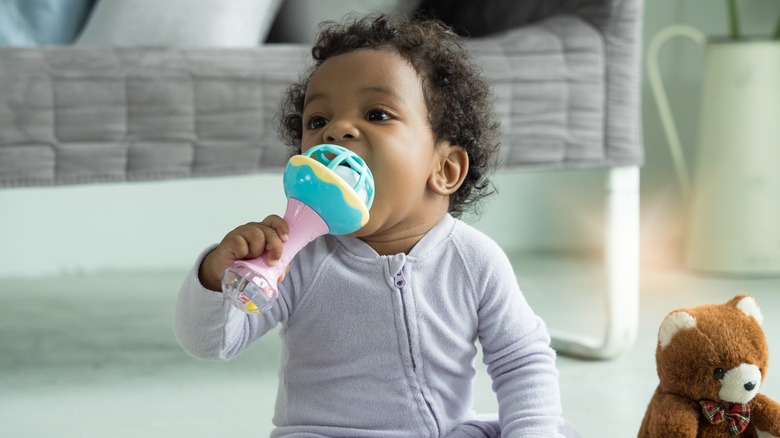What Does It Mean When Your Baby Starts Blowing Raspberries?
If you're a parent, you've undoubtedly noted the day your baby first smiled, rolled over, and pointed. That's because they're all important milestones in the course of your child's development. But another milestone that doesn't get as much attention is when your little one first blows raspberries. It's as big as the other more notable skills because it tells you that your baby is progressing and is close to uttering her first words.
Experts in child development say babies start vibrating their lips, blowing bubbles, and creating raspberries between the ages of four and seven months (per WebMD). However, some may begin as early as three months (via Healthline). The first raspberry happens by happy accident. "Babies are experimenting with their mouths, voices, and volume," Allie Gallinger, a speech-language pathologist, tells Healthline. Around the same age, babies engage in other vocal exercises, such as babbling with sounds that begin with a consonant (e.g., "da"), lip-smacking, tongue clicking, and vocalizing for emotional expression or attention (per Romper).
Blowing raspberries emerges at this time due to an increase of saliva, which coincides with the introduction of solid foods. Saliva softens solid foods, makes swallowing unfamiliar foods easier, flushes away food bits, and protects newly sprouted teeth. But who can resist also using saliva to emphasize fun sounds, blow bubbles, and create a tickly, buzzy feeling on the lips? Not a 6-month-old baby.
Why blowing raspberries deserves a spot in Baby's Milestones book
Even before he enters the world, a baby hears sounds, and at birth, he recognizes his mother's voice. In the early weeks and months of life, according to WebMD, a baby pays attention to the pitch and volume of the voices surrounding him. He learns that soothing voices sound better than angry ones. He begins to coo, using vowel sounds, then nasal sounds, such as "Ms" and "Ns," Michele Martinez Chadrom, a bilingual speech and language pathologist at Children's Hospital Colorado, tells Romper.
At about four months, he begins to discriminate between individual sounds, and how vowels and consonants combine into words. Soon after, he begins trying to mimic the vocal sounds he hears. Blowing raspberries is one result. Creating a cluster of bubbles and making sounds with them is an essential step for eventually learning how to talk. It strengthens the facial muscles necessary for forming words, Gallinger tells Healthline.
Martinez Chadrom agrees. She explains to Romper that when a baby blows raspberries, he's practicing fine motor skills of the lips and tongue, as well as learning to coordinate the individual muscles of the mouth and cheeks and figuring out how to move air through the vocal tract all at the same time. Blowing raspberries also prepares babies for eating and drinking. The movements used when blowing bubbles strengthen muscles that assist with eating and with closing the lips when drinking from an open cup.
There's even a social aspect to blowing raspberries
While the first raspberry happens by chance, succeeding ones are more intentional. A baby enjoys the funny sound, the tickly feeling on the lips, and the reaction of people around her. So she'll recreate it over and over again to get more tickles, laughs, and attention.
When parents blow berries back, it models the turn-taking of conversation. A baby learns "that language and making sounds is social: You do something and then someone reacts to you, or begins a back-and-forth," Martinez Chadrom explains to Romper. So alternating blowing raspberries is particularly beneficial for the parent-child relationship. It's a perfect way to engage with your little one, maintain eye contact, laugh together, and show her your happy facial reactions (per Healthline).
Sure, a baby blowing raspberries is cute — until it's not. It may make parents laugh initially, but once raspberries are deployed with a mouth full of food, the whole scene becomes quite messy. And, therefore, not as funny. Still, parents need to encourage a baby to keep blowing berries for physical development and the social growth associated with communication despite the flying debris. So try to ignore the applesauce sprayed all over the place. It's a small price to pay for the significant developments that come after blowing bubbles. At about a year old, she'll be saying her first word, thanks to the raspberries.
Should you be worried if your baby isn't blowing raspberries?
If your baby isn't yet blowing raspberries, there usually isn't cause for alarm, reports WebMD. Babies usually begin to blow raspberries by six months of age, though not every child develops exactly on schedule. If your little one makes it to the half-year mark without blowing a raspberry and also isn't able to make eye contact, is struggling to sit up on their own, has difficulty swallowing soft food, or is rarely interactive in terms of babbling or smiling, then consulting with your pediatrician can help you determine your baby's unique development.
Not showing signs of verbal communication like babbling or cooing by eight months might also indicate an issue with your baby's hearing, says WebMD. But don't panic — sometimes delays in verbal and auditory development can be the result of ear infections or another underlying cause that can be more easily resolved. Also keep in mind that babies tend to get their first tooth between six and 12 months of age, meaning that your baby could be experiencing discomfort in their mouth (via Healthy Children). Along with the excess saliva and dribble that comes with teething, the painful, inflamed gums that accompany a new tooth breaking through may make your little one irritable (per Mother and Baby). Honestly, who wants to blow a raspberry when their mouth hurts?



